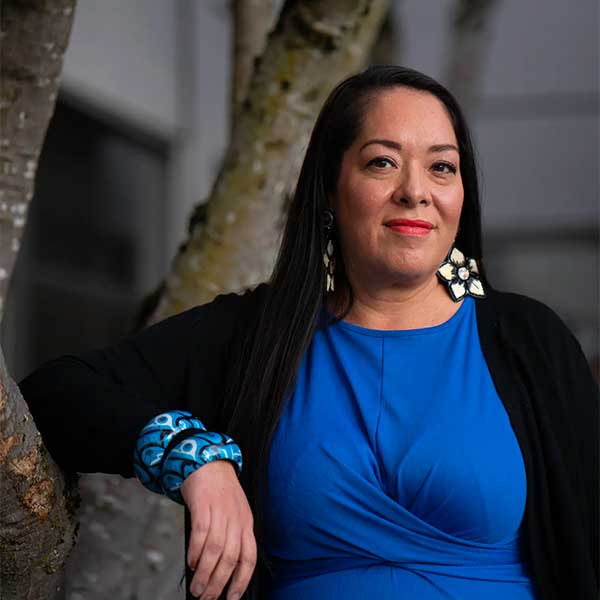
TEC News
Tribal EpiCenters
11/16/2023
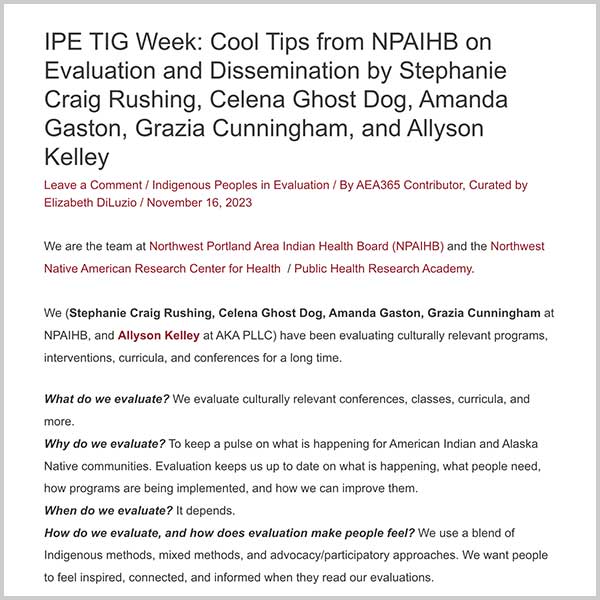
AEA 365
We are the team at Northwest Portland Area Indian Health Board (NPAIHB) and the Northwest Native American Research Center for Health / Public Health Research Academy. We (Stephanie Craig Rushing, Celena Ghost Dog, Amanda Gaston, Grazia Cunningham at NPAIHB, and Allyson Kelley at AKA PLLC) have been evaluating culturally relevant programs, interventions, curricula, and conferences for a long time.
Stephanie Craig Rushing, Celena Ghost Dog, Amanda Gaston, Grazia Cunningham at NPAIHB, and Allyson Kelley
November 16, 2023
Tribal EpiCenters
10/24/2023
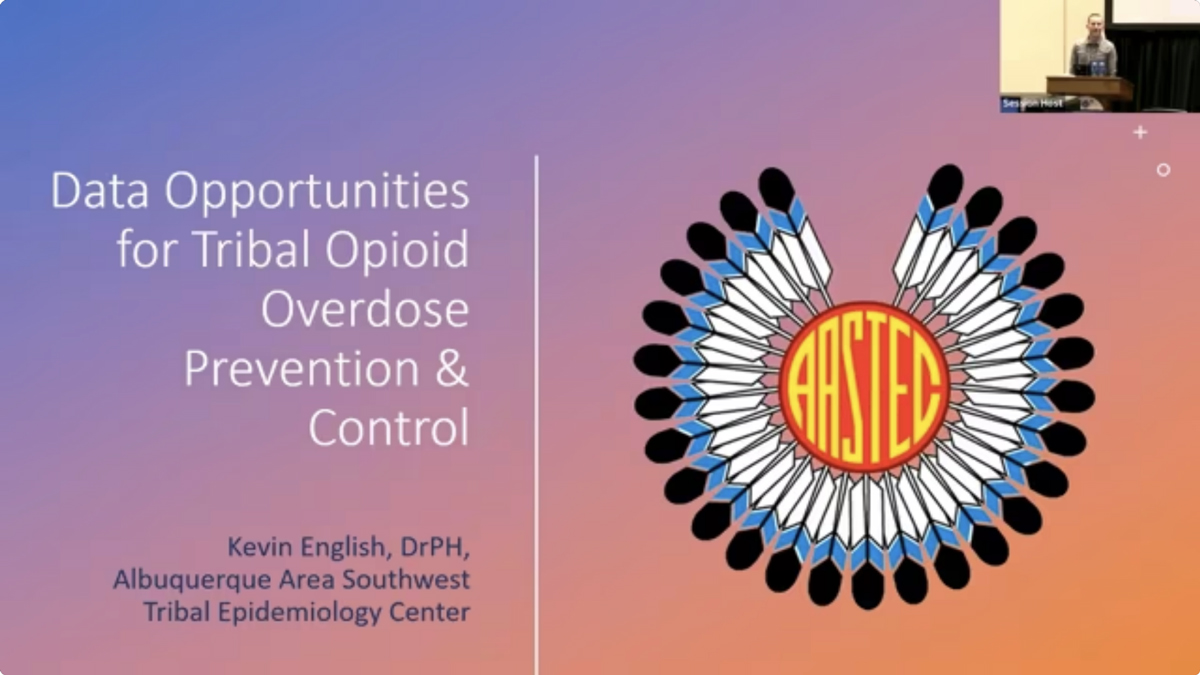
Seven Directions is immensely grateful for all of the knowledge shared by participating TEC Directors and staff. See some of the conference highlights below!
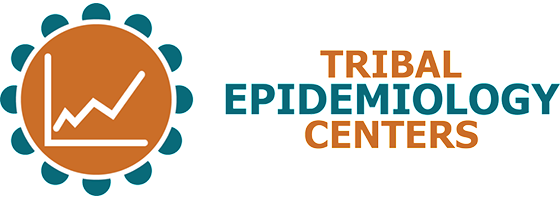
For more information about each of the 12 TECs, visit https://tribalepicenters.org/12-tecs/.
6.28.23 – Data Opportunities for Tribal Opioid Overdose Prevention & Control from Seven Directions indigenousphi.
Dr. Kevin English, Director of the Albuquerque Area Southwest Tribal Epidemiology Center, hosted a breakout session on June 28, presenting “Data Opportunities for Tribal Opioid Overdose Prevention & Control.” English shared information about currently available data sources that can be leveraged to characterize the burden of opioids among American Indian and Alaska Native populations, including opportunities for opioid-related data and surveillance enhancement and primary data collection.
Michael Mudgett, Substance Use Epidemiologist at the Northwest Portland Area Indian Health Board, hosted a breakout session on June 28, presenting “Improving AI/AN Overdose Data Through Data Linkages.” In this presentation, Mudgett described how NPAIHB has utilized data linkages to correct racial misclassification and address the improvement of drug overdose mortality data among American Indian and Alaska Native people in Washington, Oregon, and Idaho vital statistics databases, respectively.
Tim Collins, Senior Epidemiologist at the Alaska Native Epidemiology Center, led an experiential learning session on June 29, titled, “Opioids and the Brain: How Augmented Reality can inform treatment and build health literacy.” In this session, participants had the opportunity to wear a Hololens2 headset to experience interactive holograms that illustrate the potential effects of opioid use on the brain and how treatment can help. Collins also discussed the rationale for using augmented reality in patient education, special considerations for substance use disorders, and limitations of the technology.
Tribal EpiCenters
10/05/2023

Medium
Abigail Echo-Hawk, MA, is an enrolled citizen of the Pawnee Nation of Oklahoma and is currently the director of the Urban Indian Health Institute and executive vice president of the Seattle Indian Health Board. What’s Next Health spoke with Ms. Echo-Hawk about her recent work to decolonize data — where Indigenous peoples and nations have ownership over the collection, management, and dissemination of their own data — which is supported in part by the Robert Wood Johnson Foundation.
WNH Editors
May 24, 2023
Tribal EpiCenters
09/28/2023
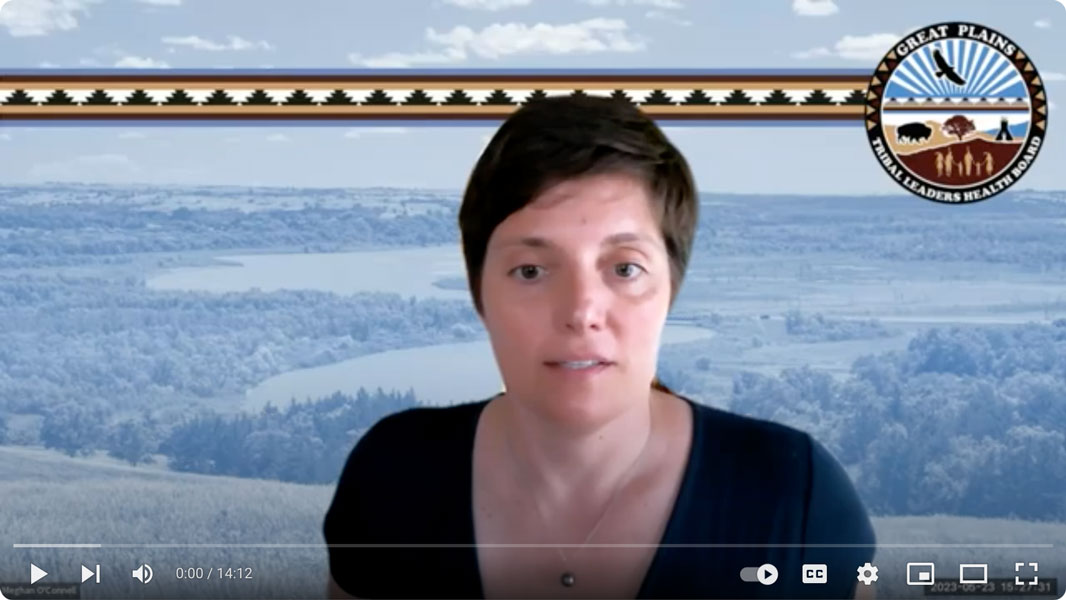
In this video presentation to the Centers for Medicare & Medicaid Service (CMS) Tribal Technical Advisory Group (TTAG) Data Subcommittee on May 23, 2023, Meghan O’Connell, MD, MPH (Chief Public Health Officer of the Great Plains Tribal Leaders’ Health Board) and Chris Alibrandi O’Connor, JD (Deputy Director, Mid-States Region Office for The Network for Public Health Law) share the legal basis for Tribal Epidemiology Center’s (TEC) access to protected health information for public health purposes.
These activities were supported through a variety of funding opportunities including the coordination and collaboration activities made possible by the Indian Health Service and the CDC’s Tribal Epidemiology Centers Public Health Infrastructure program, National Center for Chronic Disease and Prevention and Health Promotion, Healthy Tribes Program.
TEC Public Health Authority 101

For more information about each of the 12 TECs, visit https://tribalepicenters.org/12-tecs/.
